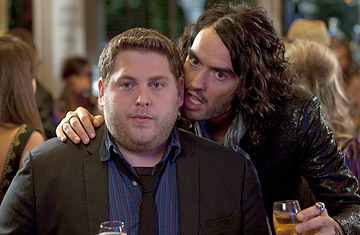
A scene from Get Him to the Greek
Aaron Green (Jonah Hill) has a moral dilemma. In the shaggily amusing but familiar and way-too-long Get Him to the Greek, Aaron, a no-level employee at a record label, has been entrusted with shepherding a drugged-out Brit rock star named Aldous Snow (Russell Brand) to his big comeback concert at the Greek Theatre in Los Angeles. As they stand in line at airport security before a flight from London to New York, Aldous flexes his star status and insists his minder do him a favor that Aaron has just a few qualms about.
Nothing unusual here. The hero of a traditional comedy is often confronted with tough decisions: should he confess to the girl he's fallen in love with that he's already engaged, or that he's a spy or a reporter or an alien? But Aaron's problem is a bit more sensitive: he has to decide whether he'll stick a packet of heroin up his rectum, so the notorious Aldous won't get caught with it. The security line is getting shorter; Aaron has no time to send a quick, desperate note to the New York Times' Ethicist column. Aldous is getting impatient: he gives Aaron the curt command, then tells him how to expel the item. "Clench and sneeze."
Welcome back to the bizarro universe of Judd Apatow movies, where everyday moral challenges are pushed to the comic extreme. The decision facing Aaron is one that troubles working stiffs anywhere: what awful thing would I do to advance my career or simply keep my job? Later, he undergoes the domestic equivalent of this option: Will he accede to his girlfriend (Mad Men's Elizabeth Moss) in her desire to have a three-way with Aldous? There's not much question about Aaron's resolution of the drug-mule debate, since Get Him to the Greek, written and directed by Nicholas Stoller, is a fond satire of the music biz — and since one strategy of an Apatow-produced movie is to put the protagonist through the deepest pain and embarrassment. As in, Clench and Sneeze. Ouch and Ewwww.
For audiences, Get Him to the Greek fits in the mid-comfort zone of Apatow's discomfiting comedies. It features a smartly pugnacious and self-parodying turn by Sean Combs as the record label boss, and visits by music icons Pink, Christina Aguilera and Metallica's Lars Ulrich, plus a cameo by another Times columnist — a Nobel prize-winner whose reputation I won't stain by naming him. Hill looks to have expanded to Macy's-parade balloon size since Superbad but plays the same prematurely middle-aged guy he did there. Brand, best known for sadistic prank calls on BBC radio and bombing twice as MTV Music Video Awards host, makes Aldous the engaging, exasperating sort who's been getting his reckless way for decades. The movie also has an utterly extraneous get-blotto-in-Vegas sequence, ostensibly to remind us that, this time last year, we all went to see The Hangover. Which Greek won't be.
The movie is a sequel of sorts to Forgetting Sarah Marshall, the sweet and funny Jason Segel ode to obsessive love, Dracula puppet musicals and an actor's need to show his penis. Aldous was a minor figure there — the new beau of Segel's ex — and Stoller, who directed Forgetting from Segal's script, expanded that character as the problem child and raging id of the new film. Greek is also a kind of remake of last year's Funny People, Apatow's ambitious, endless study of celebrity and its hapless satellites. In that one, an aspiring comedy writer (Seth Rogen) becomes the caretaker of a top movie comic (Adam Sandler). Both films orchestrate the collision of a famous, manic person — essentially an overgrown child — with a fairly decent schlub, who serves as his babysitter and erratic moral compass.
One difference: In Funny People, the Sandler character thought he had a fatal disease; here, Aldous is more or less killing himself with booze, drugs and a disastrous concept album called African Child. (Sorry, guys, Sacha Baron Cohen pretty much spiked that concept into the ground in last year's Bruno.) Aldous doesn't really see himself in need of saving: he subscribes to the received wisdom that you can't have rock 'n roll without sex and drugs. In fact, the notion behind both films is that show people — especially stand-up comics and rock stars, who rely so crucially on aggression and sex obsession — are not like the rest of us. To create their magic in public, they need to act out in private. Aaron finally gets the message, telling Aldous, "You make your insanity sound good." Says Aldous, "That's rock 'n roll."
True or not, this idea isn't exactly late-breaking news; it has informed inside-Hollywood movies for generations, from A Star Is Born to Tropic Thunder. The new one should be fast, rude and with no redeeming ending. Yet a hallmark of the School of Apatow is a fourth act with lots of learning and hugging — one reason his movies keep nearing or surpassing the dreaded two-hour limit. Speaking metaphorically, mind you, we'd say they're like Aaron at the airport: the feel the need to insert a message, some heart, into the grubby comedy. They also need to make the mean-spirited guys we've enjoyed hating throughout the film people we can approve of at the end. But nobody goes to an R-rated man-love comedy for spiritual renewal. We just want more outlandish gags. Down with the uplift; up with the suppository jokes.
